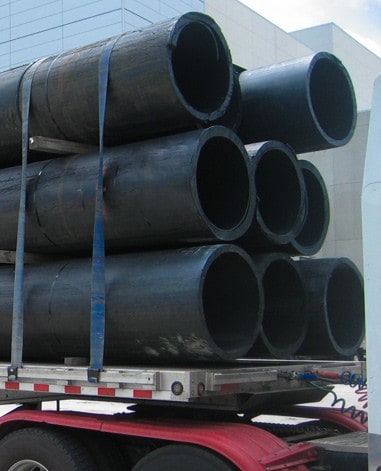Why Partnering with Pipe Supplier American Plastics Midland Ensures Trusted Solutions
Wiki Article
Comprehending the Key Benefits of HDPE Pipe for Water and Wastewater Monitoring
The usage of HDPE pipeline in water and wastewater management presents numerous benefits that merit factor to consider. Its remarkable resilience and long life-span make it a preferred option for numerous jobs. Additionally, the material's resistance to rust and chemical damage enhances its dependability in numerous settings. Nonetheless, the advantages expand past simply durability and resistance. Exploring its cost-effectiveness and ecological influence reveals a lot more engaging factors for its widespread adoption in contemporary facilitiesRemarkable Sturdiness and Durability

HDPE pipe stands apart for its phenomenal toughness and durability, making it a recommended option in water monitoring systems. Created from high-density polyethylene, these pipelines can hold up against significant stress and tension, making sure reputable performance gradually. Their durable nature permits them to sustain severe ecological conditions, consisting of temperature changes and soil motions, which can cause various other products to stop working.
The lifespan of HDPE pipelines often surpasses 50 years, supplying an economical service for communities and sectors alike. In addition, the product's lightweight residential or commercial properties streamline setup, lowering labor costs and timeframes. This durability decreases the requirement for constant fixings or replacements, better enhancing its financial appeal.
In water administration applications, the dependability of HDPE pipes suggests less disturbances and enhanced service continuity, making them integral to lasting facilities advancement. The combination of resilience and longevity strengthens HDPE's role as a foundation in reliable water administration solutions.

Resistance to Deterioration and Chemical Damages
While several materials catch corrosion and chemical damage with time, HDPE pipelines exhibit exceptional resistance, making them ideal for numerous water monitoring applications. This strength comes from the molecular framework of high-density polyethylene, which is inherently non-reactive and does not corrode like steels or weaken from direct exposure to severe chemicals. As an outcome, HDPE is highly effective in atmospheres with hostile materials, such as wastewater systems that might contain acids, bases, and organic solvents.
In addition, HDPE pipes can endure environmental variables such as dirt acidity and saline conditions, further boosting their viability for varied applications (American Plastics HDPE Pipe for Oilfield). Their capacity to preserve architectural stability gradually minimizes the risk of leaks and failings, which is essential in making certain the safety and security and integrity of water distribution and wastewater monitoring systems. The resistance to rust and chemical damage significantly adds to the overall performance and long life of HDPE piping solutions.
Cost-Effectiveness and Financial Advantages
When considering the financial ramifications of water management systems, the cost-effectiveness of HDPE pipes ends up being noticeable. These pipes use reduced installment and upkeep costs compared to traditional materials like steel or concrete. Their lightweight nature streamlines transportation and setup, resulting in lowered labor expenditures. In addition, HDPE pipelines display a lengthy life-span, often going beyond 50 years, which converts to less replacements and long-lasting savings.The resistance of HDPE to deterioration and chemical damage decreases the need for costly repair services and substitutes. The pipelines likewise sustain effective water circulation, reducing energy costs connected with pumping systems. By alleviating leaks and water loss, HDPE pipes contribute to considerable financial advantages for municipalities and markets alike. On the whole, the initial investment in HDPE piping can yield considerable monetary returns over the life-span of the water management system, making it a prudent selection for lasting facilities advancement.
Environmental Sustainability and Lowered Impact

Versatility and Adaptability in Installation
Due to the fact that of their distinct residential or commercial properties, HDPE pipelines supply amazing convenience and flexibility in installation, making them appropriate for a variety of applications. Their lightweight nature permits for less complicated handling and transportation, decreasing labor expenses and installment time. HDPE pipelines can be bent and formed to fit numerous surfaces and job needs, which is specifically beneficial in challenging environments.Furthermore, their resistance to rust and chemical damage enables for setup in diverse setups without the demand for specialized safety coatings. The capacity to fuse joints develops a continual, leak-free system, boosting the general stability and dependability of the setup. HDPE's flexibility likewise fits ground motion, decreasing the danger of damage in locations vulnerable to moving soil. In general, these characteristics make HDPE pipelines not just flexible but also a recommended selection for water and wastewater monitoring systems.
Often Asked Questions
Just How Does HDPE Pipeline Compare to PVC in Water Management Applications?
HDPE pipeline provides exceptional flexibility, resistance to deterioration, and longevity contrasted to PVC. Its lighter weight helps with simpler installation, while its lengthy life expectancy reduces substitute expenses, making HDPE a preferred selection in water management applications.What Is the Life-span of HDPE Water Lines Under Common Problems?
Under common conditions, HDPE pipes can have a lifespan varying from 50 to 100 years. Their resilience and resistance to deterioration contribute to their long-lasting performance in various applications, making them a trustworthy choice for infrastructure.Are HDPE Pipeline Recyclable After Their Service Life?
Yes, HDPE pipes are recyclable after their life span. hdpe pipe in stock Midland hdpe pipe suppliers Midland TX TX. They can be refined and repurposed right into brand-new products, substantially reducing environmental impact and promoting sustainability within the market, making them an environmentally friendly option for piping solutionsWhat Is the Installment Refine for HDPE Water Lines?
The installation process for HDPE pipes entails website preparation, trenching, pipeline fusion or mechanical joining, backfilling, and stress testing. Appropriate strategies ensure a durable and effective system for transporting water and wastewater properly.Can HDPE Water Lines Be Utilized for Both Drinkable and Non-Potable Water Systems?
Yes, HDPE pipelines can be made use of for both safe and clean and non-potable water supply. Their adaptability, durability, and resistance to rust make them suitable for numerous applications, ensuring safe and efficient transport of water in different contexts.Report this wiki page